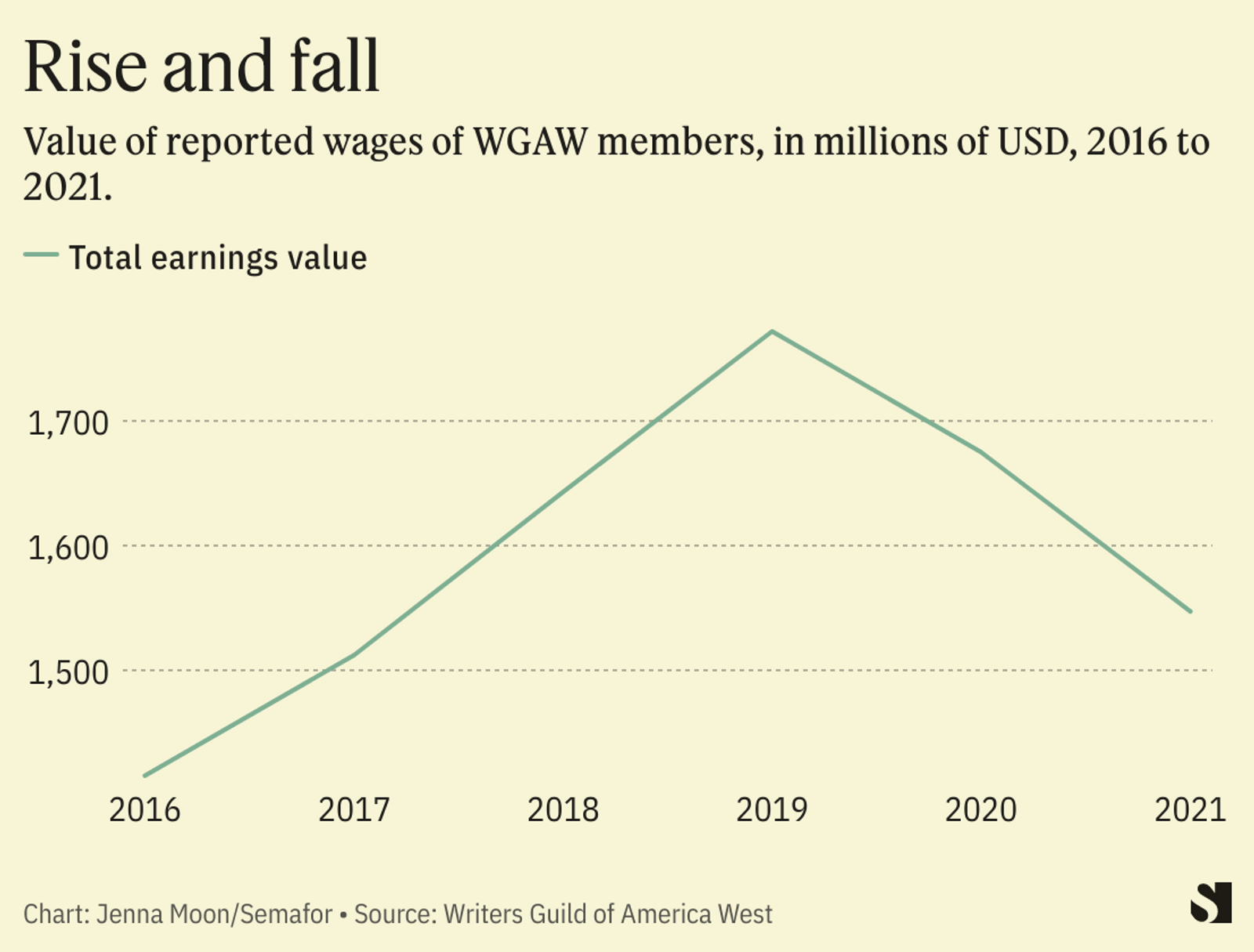The Hollywood Strike: What It Means For The Film And Television Industry

Table of Contents
The Core Issues Driving the Hollywood Strike
The Hollywood strike is fueled by a multitude of long-standing grievances, culminating in a collective refusal by writers and actors to accept the status quo. The WGA and SAG-AFTRA's demands center around fair compensation in the age of streaming, the ethical use of artificial intelligence, and improved working conditions.
-
Fair Wages and Residuals in the Streaming Era: The rise of streaming platforms has dramatically altered the compensation landscape for writers and actors. Traditional residuals, payments based on reruns and syndication, have been significantly diminished, leaving many struggling to maintain a living wage in the face of increased production costs and the demands of a competitive market. The shift to streaming also impacts how shows are viewed and therefore how the work is monetized, significantly reducing compensation for creators. This is a key point of contention in the strike.
-
Concerns Regarding the Use of AI in Scriptwriting and Performance Capture: The rapid advancement of artificial intelligence technology poses a significant threat to the livelihoods of writers and actors. The use of AI in script generation and performance replication raises concerns about job displacement, creative control, and the exploitation of creative work without proper compensation. The unions are demanding safeguards and regulations to protect their members from this rapidly evolving technology.
-
Improved Working Conditions and Health Benefits: The entertainment industry is notorious for its demanding schedules and often precarious working conditions. The unions are advocating for improved health benefits, reasonable work hours, and safer working environments. This includes addressing the pressures and stress placed upon their members and ensuring their well-being is appropriately considered.
-
Regulation of Self-Taping Practices: The increasing prevalence of self-taping auditions has created new challenges for actors. The unions are seeking regulations to ensure fair compensation and safe working conditions for these increasingly common self-directed audition processes.
Immediate Impact on Film and Television Production
The Hollywood strike has brought production to a near standstill, impacting a vast array of projects. The immediate consequences are far-reaching and affect many beyond just actors and writers.
-
Delayed Release Dates for Upcoming Movies and TV Shows: The strike has already caused significant delays in the release of numerous films and television shows, impacting release schedules and potentially altering marketing strategies.
-
Financial Losses for Studios and Production Companies: The shutdown of production represents a massive financial blow to studios and production companies, resulting in lost revenue and potential budget overruns on delayed projects. This financial strain is also affecting investment in future projects.
-
Job Losses for Crew Members and Other Industry Professionals: Beyond actors and writers, countless other industry professionals – from grips and gaffers to caterers and drivers – are experiencing job losses due to the production halt. This ripple effect amplifies the economic consequences of the strike.
-
Impact on Marketing and Promotional Campaigns: The timing of releases has been significantly impacted resulting in a major disruption to the planned marketing and promotional campaigns for many upcoming projects. This affects the studios' ability to build hype and generate ticket sales or viewer numbers.
Long-Term Effects on the Film and Television Industry
The long-term ramifications of the Hollywood strike are potentially transformative. The outcome could reshape the industry's power dynamics and creative landscape for years to come.
-
Shift in the Power Dynamic Between Studios and Creative Professionals: The strike could lead to a renegotiation of power between studios and creative professionals, potentially giving the unions greater leverage in future negotiations.
-
Potential Changes to Production Models and Industry Practices: The strike may necessitate a reevaluation of current production models, potentially leading to more sustainable and equitable practices within the industry.
-
Evolution of Streaming Platforms and Content Creation Strategies: Streaming services may need to adjust their content creation strategies to accommodate the demands of the unions, potentially altering the types of shows and films produced.
-
Impact on Audience Viewing Habits and the Future of Storytelling: The prolonged absence of new content could affect audience viewing habits and potentially alter the trajectory of storytelling in film and television.
The Economic Fallout Beyond Hollywood
The economic consequences of the Hollywood strike extend far beyond the entertainment industry itself, impacting numerous related sectors and local communities.
-
Job Losses in Supporting Industries: Businesses that rely on the film and television industry – such as catering services, transportation companies, and equipment rental businesses – are experiencing significant job losses.
-
Economic Impact on Local Communities Dependent on Film Production: Communities that heavily rely on film production for economic activity are facing significant financial setbacks due to the strike's impact on local businesses and employment.
-
Losses for Businesses and Tourism Related to Film Premieres and Events: The cancellation or postponement of film premieres and related events results in significant losses for businesses and tourism-related sectors.
Potential Resolutions and Future Negotiations
Resolving the Hollywood strike will require compromises from both the unions and the studios. Several scenarios could unfold:
-
Potential Compromises and Concessions from Both Sides: Reaching a resolution will likely necessitate concessions from both the studios and the unions, finding a balance between the interests of all parties involved.
-
The Role of Government Intervention or Regulation: Government intervention or regulation may play a role in shaping the outcome of the strike, potentially influencing future negotiations and industry practices.
-
The Long-Term Implications for Collective Bargaining in the Entertainment Industry: The outcome of this strike will set a precedent for future collective bargaining in the entertainment industry, shaping the relationship between labor and management for years to come.
Conclusion
The Hollywood strike is a watershed moment, highlighting crucial issues of fair compensation, the ethical use of AI, and the need for improved working conditions within the entertainment industry. The strike's impact is multifaceted, affecting not only actors and writers but also numerous related industries and local economies. The potential long-term consequences are profound, potentially reshaping the power dynamics and creative landscape of film and television production. The outcome of this dispute will significantly influence the future of storytelling and the way content is created and distributed. Stay informed about the evolving situation in this unprecedented Hollywood strike and its impact on the future of film and television. Continue to follow reliable news sources for updates on negotiations and resolutions.

Featured Posts
-
 Nba Legend Magic Johnson Predicts Knicks Vs Pistons Winner
May 11, 2025
Nba Legend Magic Johnson Predicts Knicks Vs Pistons Winner
May 11, 2025 -
 Bayerns Bundesliga Win Mullers Emotional Home Game Send Off
May 11, 2025
Bayerns Bundesliga Win Mullers Emotional Home Game Send Off
May 11, 2025 -
 Hvem Vinder Dansk Melodi Grand Prix 2025 Afstemningen Er I Gang
May 11, 2025
Hvem Vinder Dansk Melodi Grand Prix 2025 Afstemningen Er I Gang
May 11, 2025 -
 Le Fil D Ariane La Nouvelle Saison Avec Chantal Ladesou Arrive Sur Tf 1
May 11, 2025
Le Fil D Ariane La Nouvelle Saison Avec Chantal Ladesou Arrive Sur Tf 1
May 11, 2025 -
 Semana De Turismo En Uruguay Por Que Se Llama Asi Y Que Revela Sobre Su Laicidad
May 11, 2025
Semana De Turismo En Uruguay Por Que Se Llama Asi Y Que Revela Sobre Su Laicidad
May 11, 2025
